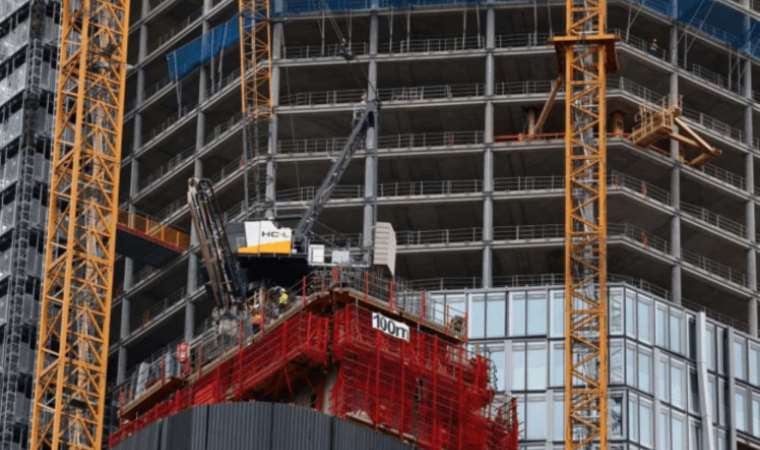Why Germany's property sector is in the dumps
Germany has long benefited from an era of cheap money that fuelled a decade-long boom in real estate, but now the sector is grappling with a major turn of fortune.

In the latest signs of stress in the sector, Germany's largest real estate group Vonovia posted multi-billion euro losses and writedowns, and job growth for construction workers has stagnated.
Here are some key questions as the crisis unfolds:
WHY DO WE CARE ABOUT GERMANY?
Weakness in real estate has also emerged in the United States and Sweden, but Germany is significant because it is Europe's largest economy and the biggest real estate investment market on the continent.
The property sector makes up roughly a fifth of economic output and one in ten jobs, according to the German Property Federation.
HOW BAD IS IT?
New construction plummeted in Germany during the first half of the year, dropping 47% compared with the average of the past two years, and new building permits plunged 27% during the first five months.
Home prices also declined in the first quarter by the most since Germany's statistics office began keeping data, down 6.8% from a year earlier.
In September, data will show to what extent the trend is continuing and shed light on the state of construction jobs.
"The current crisis will certainly continue for a while yet," said Sven Carstensen, chief executive of Bulwiengesa, a property consultant and analysis firm.
WHAT'S BEHIND THE SLUMP?
The main factor has been a sudden and rapid rise in interest rates by the European Central Bank as it clamps down on the highest inflation rates in decades, but there's more to it.
Building costs have also soared, and the demand for offices and retail space has waned after the pandemic. The Ukraine war has also made German property seem riskier for foreign investors.
"If you are an investor from the Middle East, Germany seems to be quite close to Ukraine. They say, 'I want to allocate money to the US and Asia and not to Germany,'" said Florian Schwalm, a consultant with EY.
WHAT'S NEXT?
Germany, whose population has recently grown as millions of migrants and refugees from Ukraine flock to the country, aims to build 400,000 apartments a year but is struggling with its goals.
Politicians, ministries and the property industry will convene with Chancellor Olaf Scholz on Sept. 25 to try to find solutions, and some are already jockeying with proposals to rejuvenate the sector.
WHAT ARE THE IDEAS?
Last week, Klara Geywitz, Germany's housing minister, called for additional tax breaks for writing off the costs of construction for new residential buildings.
The president of the German Property Federation, Andreas Mattner, is pressing the government to temporarily suspend a property sales tax and is demanding a low-interest rate credit program to support new residential building.
Tim-Oliver Mueller, head of the German Construction Industry Federation, is pushing for an emergency package of measures that would include the cut-price sale of public land for building rentals.

En Çok Okunan Haberler
-
 Korhan Berzeg olayında yeni gelişme
Korhan Berzeg olayında yeni gelişme
-
 İstanbul'da zincirleme kaza
İstanbul'da zincirleme kaza
-
 Polis meslektaşlarına ateş etti
Polis meslektaşlarına ateş etti
-
 Mert Hakan Yandaş'dan sosyal medyada çok sert tepki!
Mert Hakan Yandaş'dan sosyal medyada çok sert tepki!
-
 Müsavat Dervişoğlu İYİ Parti Genel Başkanı oldu
Müsavat Dervişoğlu İYİ Parti Genel Başkanı oldu
-
 En yüksek faizi hangi banka veriyor?
En yüksek faizi hangi banka veriyor?
-
 Kuryeden ‘görev tamam’ pozu!
Kuryeden ‘görev tamam’ pozu!
-
 Yıllar sonra gelen itiraf: 'Onlar varsa oynamam dedim'
Yıllar sonra gelen itiraf: 'Onlar varsa oynamam dedim'
-
 'Hiçbir şey eskisi gibi olmayacak'
'Hiçbir şey eskisi gibi olmayacak'
-
 İYİ Parti'de tarihi kurultay: Seçim üçüncü tura kaldı!
İYİ Parti'de tarihi kurultay: Seçim üçüncü tura kaldı!

















